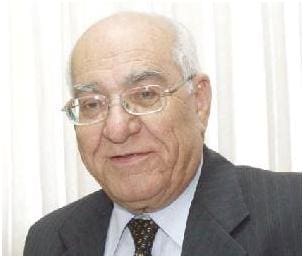In an April 30, 2017 article titled "Unpopular Statements," Tareq Al-Masarwa, Jordan's former culture minister and a senior columnist for the government daily Al-Rai, wrote that the U.S. can move its embassy to West Jerusalem[1] because the Palestinians and Arabs do not claim that part of the city. He called on the Arabs to face reality in light of the fundamental changes that have occurred in the Arab world in the last few years, and discard illusions of victory and fairytales about resistance.
The following are excerpts from his article:[2]

Tareq Al-Masarwa (image: Ahkelak.net)
"The Americans can move their embassy to the new [part of] Jerusalem [i.e. the western part] without sparking any serious rage among the Arabs. This is for the simple reason that the Palestinians and Arabs demand the Old City [of Jerusalem] – which they lost in the 1967 war, known as the Six Day War – as the capital of their state. I have not heard anyone demanding the 1948 part of Jerusalem [i.e., West Jerusalem], neither Hamas, the PLO nor anyone else.
"There is talk about U.S. President [Donald] Trump visiting the region [soon], including the hotspots of Israeli-Palestinian tension. Although the man is known for the promises he made before and after the elections, he can play the game of 'Jerusalem the capital [of Israel]' without causing awkwardness for [either] U.S. policy or his allies...
"I do not mean to seem like a spoil-sport. The U.S. president will meet Abu Mazen [Mahmoud 'Abbas on May 3, 2017] and this meeting is meaningful, despite everything that is said about [Trump] constantly changing his mind according to his whim. The Palestinian president will demand a demilitarized state, to exist securely alongside Israel. The [late Palestinian] president Yasser Arafat also agreed at some point to the formula of 'administrative autonomy' in return for [permission to] return to Palestine. The Israeli occupation, [for its part,] has already come to terms with all the characteristics of the Palestinian state, except for the aspect of changing its basic designation [i.e., calling it a state rather than an authority or an autonomy].
"Today many things have changed, and much water has passed under the bridge, as the saying goes. It's time to face the bitter reality. Who thought that the Syria disaster would enter its seventh year, that Iraq would [have to] borrow money to pay the salaries of its civil servants, that an Arab war would rage in Yemen, and that Libya would return to the state it was in before King Idris unified its three provinces?
"[King] 'Abdallah II managed to revive the [Arab League] summit on the Dead Sea and to strike a pact of Arab cooperation in this region. It's time to face reality as it is, without the illusion of victory and the fairytales about resistance, for we are not in the best of situations."
[1] Senior journalist 'Abd Al-Rahman Al-Rashed made similar statements in Al-Sharq Al-Awsat. See MEMRI Special Dispatch No. 6764, Prominent Saudi Journalist: West Jerusalem Is Part Of Israel; Moving The U.S. Embassy There As Part Of Overall Peace Agreement Could Herald The End Of The Israeli-Palestinian Conflict, January 31, 2017.
[2] Al-Rai (Jordan), April 30, 2017.




